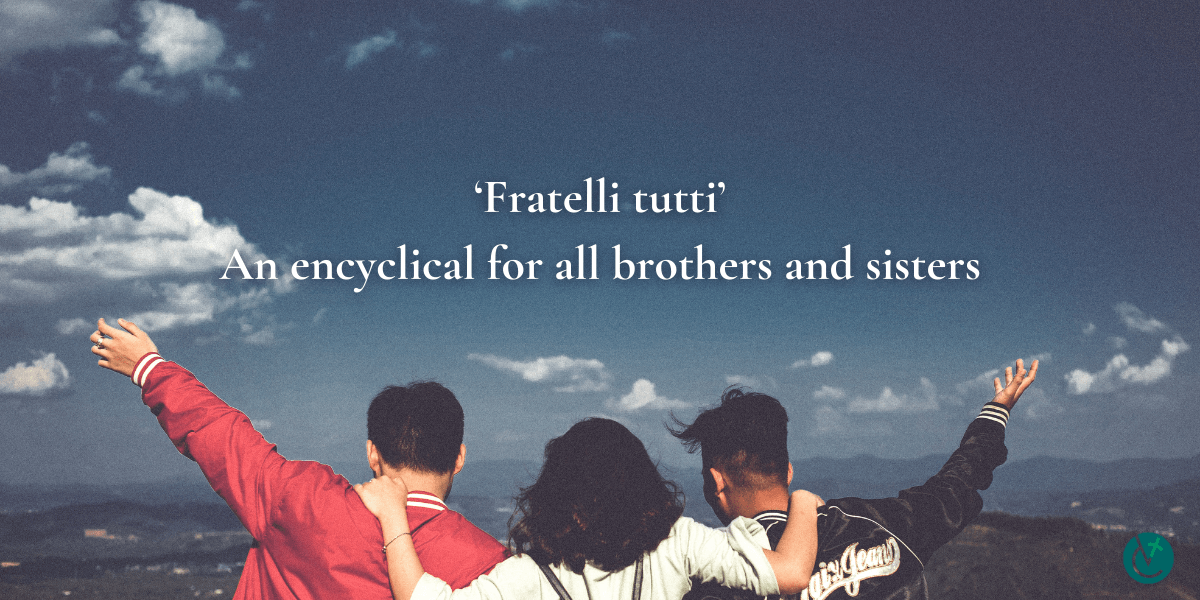
‘Fratelli tutti:’ An encyclical for all brothers and sisters
The Vatican published new papal encyclical on fraternity and social friendship on Oct. 4, the Feast of St. Francis of Assisi.
Written by Pope Francis and signed in Assisi — his namesake’s home town — the encyclical’s title, “Fratelli tutti” [Italian for “All brothers”], is taken from St. Francis who used these words as a term of endearment to “address his brothers and sisters” and to propose to them “a way of life marked by the flavor of the Gospel” (“Fratelli tutti,” #1).
As Pope Francis writes in the beginning of his new encyclical: “I offer this social Encyclical as a modest contribution to continued reflection, in the hope that in the face of present-day attempts to eliminate or ignore others, we may prove capable of responding with a new vision of fraternity and social friendship that will not remain at the level of words. Although I have written it from the Christian convictions that inspire and sustain me, I have sought to make this reflection an invitation to dialogue among all people of good will” (#6).
The theme of the encyclical is simple: We are all sisters and brothers, the children of Adam and Eve, our first parents. If only we will recognize this fact and practice basic principles of fraternity and social friendship, the evils that have confronted humankind from the beginning of time can, with the help of God’s grace, be overcome. “If every human being possesses an inalienable dignity, if all people are my brothers and sisters, and if the world truly belongs to everyone,” the Holy Father says, “then it matters little whether my neighbor was born in my country or elsewhere” (“Fratelli tutti,” #125).
The encyclical is divided into eight sections:
+ Dark clouds cover the Earth — a reflection on the serious social ills we face today
+ Strangers on the road — how the parable of the Good Samaritan teaches us to recognize the face of Jesus in all our brothers and sisters
+ Vision of an open world — the need to go “outside the self” in order to find true love and happiness
+ An open heart — the importance of welcoming strangers, especially “in response to those who are fleeing grave humanitarian crises”
+ A better kind of politics — centered on human dignity and dedicated to the common good of all
+ Dialogue and friendship — recognizing life as “the art of encounter” with all our sisters and brothers, acknowledging “the miracle of kindness shining in the midst of darkness”
+ Paths of renewed encounter — fostering peace and forgiveness while never forgetting the horrors of human cruelty and war
+ Religion and fraternity — true religion as a source of unity, not division, and as a means of achieving human fraternity, dialogue, common cooperation and mutual understanding
“Fratelli tutti” faithfully reflects the teaching of St. Francis of Assisi because its central theme is unity with all creation and our solidarity with all members of the human family created in the image and likeness of God. The pope acknowledges that living this way — in accordance with Gospel values — is not easy, but the need is urgent, and God’s grace makes all things possible.
Pope Francis concludes his new encyclical with two prayers: “A Prayer to the Creator” and “An Ecumenical Christian Prayer.” Both call for a renewed sense of sisterhood and brotherhood among all members of the human family. Both seek “a more dignified world, a world without hunger, poverty, violence and war” wherein we can discover Christ in each person regardless of who they are or where they come from.
—Daniel Conway, special to Vermont Catholic
—Originally published in the Winter 2020 issue of Vermont Catholic magazine.

